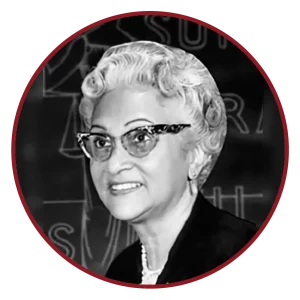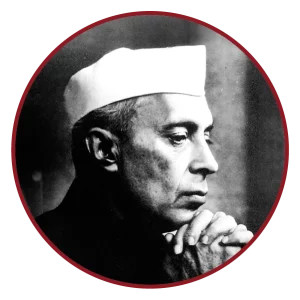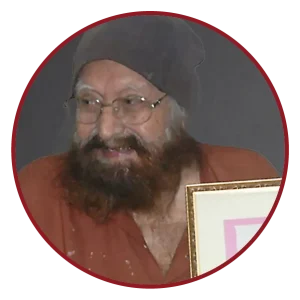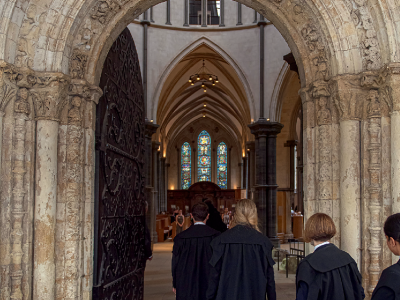

South Asian Heritage Month
During South Asian Heritage Month (18 July–17 August 2024) we celebrated some of our distinguished South Asian Members, starting with the earliest, Johannes Herapiet Wise Arathoon, who joined the Inn in 1861. Many of these early members were from Armenian families, who had settled in the Indian subcontinent. It was only after the dissolution of the East India Company in 1874, and the incorporation of large parts of South Asia into the English and Welsh legal system, that the Inn became attractive to many members from differing communities.
Many of our South Asian members led interesting and diverse lives, using the skills and ideas they learned at the Inn to further progress, not only within the legal world, but also in the fields of education, literature, and religious thought. Their values and skills were transported to their home nations, fostering self-determination and unity in the face of injustice, paving the way for many South Asian members today. Amongst the most famous, Mahatma Gandhi, Jawaharlal Nehru, and Muhammad Ali Jinnah, went on to lead their countries to independence and freedom.

John Alexander Apcar
India (1849–1923)
Admitted: 26 September 1871
Call: 17 November 1874
Apcar was the son of an Armenian merchant who settled in Kolkatain 1830, fleeing Iran via Mumbai. By the time of his birth in 1849, Apcar’s family had created a successful shipping company which transported both people and goods. After being educated at Harrow School, Apcar was admitted to the Inn on 26 September 1871, and was called to the Bar on 17 November 1874. Nicknamed ‘Father John’, Apcar served in the Bengal Legislative Council and was later elected to the Calcutta Corporation, the municipal authority, in 1912.

Bhicoo Batlivala
India (1910–83)
Admitted: 23 April 1929
Call: 8 June 1932
Born Mumbai in 1910 to a Parsi family, Batlivala was admitted to The Inner Temple on 23 April 1929, and called to the Bar on the 8 June 1932. Afterwards, she worked in the state service for the Maharaja of Baroda in Gujarat, becoming the first woman to work for the Baroda state service. She became Nehru’s secretary during his European tour and campaigned for Indian independence, and for Nehru and Gandhi’s release from prison during the Second World War.
In 1939, she married Guy Robinson Mansell and settled in Surrey in 1946. She founded Cobham Hall School in 1962.
Humayun Rasheed Choudhury
Bangladesh (1928–2001)
Admitted: 24 October 1949
Born in Sylhet in British India 1928, Choudhury was admitted to the Inn on 24 October 1949. In 1953, he left London to join the Pakistani Foreign Service. In Pakistan, and later Bangladesh, Choudhury had an illustrious career as a diplomat for several countries and organisations such as the UN and the North-South Summit in 1981. From 1996 until his death in 2001, he was elected Speaker for the Bangladesh National Assembly.
Coomee Rustom Dantra
Myanmar (1905–97)
Admitted: 14 January 1924
Call: 26 January 1928
Dantra was born in Rangoon in 1905 and was the first woman from Myanmar to be called to the Bar. Some other members of her family were lawyers, including her father, Rustomji Sorabji, who was a member of Middle Temple. She was educated in Darjeeling,admitted to The Inner Temple on 14 January 1924, and called to the Bar four years later on 26 January 1928.
She practised as a barrister until 1932, and then became a translator of French, German, and Dutch for English publications. In 1946, she translated for the International Military Tribunal in Japan.
Ma Pwa Hmee
Myanmar (1902–62)
Admitted: 21 January 1924
Call: 21 November 1926
Hmee was the eldest daughter of a civil servant. She was born and educated in Rangoon, Burma. She cut short her studies at Rangoon University and moved to London in 1923, perhaps hoping to become the first Burmese woman at the Bar. In fact, she was admitted to The Inner Temple a week after her co-patriot Coomee Rustom Dantra, on 21 January 1924, but was called first in November 1926. One press report emphasised her abilities and commitment to women’s rights: “She is an extremely well-educated woman, as well as being shrewd and quick-witted, and I should be sorry for any wife-beater out in Burma who has to stand in the witness-box and undergo half an hour of her cross-examination.”
Hmee returned to Burma hoping both “to work among women” and to inspire their ambitions and was admitted to the Burma High Court. In 1928, she was appointed Assistant Judge, becoming Burma’s first woman judge. In 1935, she became an Honorary Magistrate (first class).
She married U Myint Thein, a fellow lawyer who would become Chief Justice of the Supreme Court in 1957. She was already ill when, following a military coup in 1962, her husband was imprisoned. He was allowed to be with her in her final days only under guard and with his brother taking his place in custody; she died on 26 June 1962.

Mahatma Gandhi
India (1869–1948)
Admitted: 6 November 1888
Call: 10 June 1891
Mohandas Karamchand Gandhi was admitted to the Inn on 6 November 1888.
Born in 1869 in Gujarat, India, Mohandas Karamchand was the youngest of four children. When he turned 18, he set sail for London in September 1888, leaving behind his wife and two-month-old son. In London, he overcame his shyness through public speaking classes and was elected to the executive committee of the London Vegetarian Society. After Gandhi was called to the Bar on 10 June 1891, he returned to India where he was unsuccessful in founding a law practice. His experience of colonial discrimination in South Africa in 1893 compelled him to stay for 21 years to fight for the rights of the Indian population there.
By the time he returned to India in 1915, he was experienced in battling legal and physical oppression. Initially supportive of the British War effort in return for greater Indian self-determination, he and many Indians were left disappointed by the minimal concessions.
Assuming the leadership of the Indian National Congress in 1921, Gandhi led a unique campaign of non-violent non-conformism to protest against British imperialism and successfully maintained cross-community support. His arrest and imprisonment in 1922 led to his disbarment from The Inner Temple which was not overturned until 1988 when he was posthumously re-admitted.
Even after his death in 1948, he continues to provide inspiration and influence both at the Inn and internationally.

Mohammad Ali Jinnah
Pakistan (1876–1948)
Admitted: (ad eundem) 1931
Jinnah was born in Karachi in 1876. Originally arriving in London in 1892 for a business apprenticeship, he quickly gave that up to train as a barrister.
He joined Lincoln’s Inn in 1893 and was called to the Bar three years later. He was admitted to The Inner Temple as an ad eundem member in 1931 for the convenience of its facilities whilst he was based in chambers at 11 King’s Bench Walk. He remained in Britain between 1931 and 1934, practising as a barrister before the Privy Council on a number of India-related cases.
Whilst working for the Bombay High Court, he quickly developed an interest in politics. He became a key member for the All-India Home Rule, and later advocated for a Muslim state within India. He became the first Governor-General of Pakistan in 1947.

Ezlynn Deraniyagala
Sri Lanka (1908–73)
Admitted: 21 November 1930
Call: 19 November 1934
Deraniyagala was the first woman to be admitted to the Colombo/Sri Lankan Bar and the second woman from Sri Lanka to pass her English and Welsh Bar exams (after Avabai Bomanji Wadia, 1913–2005). Her stated ambition was to use her legal studies to help her fellow countrywomen.
In a letter to The Ship, her college newsletter, in 1937, Deraniyagala spoke of the challenges of her professional life and the lack of work for women but stated that she hoped to write on the Roman Dutch legal principles which underpin Sri Lankan law through its Dutch colonial heritage.
Whilst practising as a lawyer, she spent much of her time helping women through national and international women’s groups. She founded the Sri Lankan Women Lawyers Association in 1960 becoming its first president. She was also President of the International Alliance of Women from 1958–64 and was the first female delegate from Sri Lanka to the UN.

Jawaharlal Nehru
India (1889–1964)
Admitted: 11 January 1909
Call: 19 June 1912
Nehru was born in Allahabad in 1889. He followed in his father Motilal Nehru’s footsteps as a barrister and political activist.
Nehru first came to Britain in 1905 to study at Harrow School. He was admitted to The Inner Temple on 11 January 1909 and called to the Bar on 19 June 1912. He quickly rose to prominence with the Indian National Congress and was imprisoned because of the Quit India Resolution in 1942.
Following Indian independence in 1947, Nehru served as Prime Minister of India for 16 years.

Rehana Popal
Afghanistan
Admitted: 18 May 2012
Call: 28 November 2013
Born in 1989 in Afghanistan, Master Rehana Popal is the first Afghan national to be called to the Bar and the first Afghan woman to work as a barrister in England and Wales.
After her Call to the Bar in 2013, Master Popal briefly worked for the UN. She now specialises in public and civil law with a significant focus on human rights, community, and education law at 33 Bedford Row. In 2022, she was elected a Bencher of the Inn.

Sibghatullah Kadri
Pakistan (1937–2021)
Admitted: 30 August 1961
Call: 25 November 1969
Queen’s Counsel: 1 January 1989
Born in 1937, in modern day Uttar Pradesh, Master Sibghatullah Kadri’s family settled in Karachi following the end of British rule. He became involved in student politics, leading to his arrest in 1958. Following a trip to Britain in 1960, he was admitted to The Inner Temple and was called to the Bar in 1969. He was elected a Bencher in 1997. Suffering from racial discrimination from within and outside the legal sector, Master Kadri fought for non-minority lawyers, founding the Afro-Asian and Caribbean Lawyers Association in 1969, renamed the Society of Black Lawyers in 1972.

Ponnambalam Ramanathan
Sri Lanka (1851–1930)
Admitted: 10 June 1886
Call: 17 November 1886
Ramanathan was born on 16 April 1851 at the home of his maternal grandfather in Colombo, south western Sri Lanka (formerly Ceylon). His early studies at university in Madras, which he attended with his brother Coomaraswamy, were not successful, and the brothers were recalled home without completing their course. Ramanathan became a law apprentice under Richard Morgan, Queen’s Advocate of Ceylon and, in 1874, he became an advocate of the Colombo Bar and went on to became editor of the official law reports (the Supreme Court Circular and the New Law Reports) for ten years. He was called to the Bar by The Inner Temple in 1886 and, at the same time, stopped practising law to devote himself to religion, philosophy, and politics.
He represented Tamils on the Legislative Council of Ceylon from 1879. He was elected to the legislative council in 1911, on which he served in various capacities until 1930. He was responsible for the release of the Sinhalese leaders who had been arrested following the 1915 riots. He travelled to London and had a number of personal interviews with Andrew Bonar Law, the then-Secretary of State for the Colonies, along with other ministers and MPs pleading for the repeal of martial law, and describing the atrocities committed on his countrymen by the Punjabis, the local police, and British troops. He wrote an account of this entitled, Riots and Martial Laws of Ceylon (1915). Soon after these representations, martial law was repealed and Sir John Anderson (1858–1918) was appointed as the new Governor.

Khushwant Singh
India (1915–2014)
Admitted: 17 October 1934
Call: 21 June 1939
Author, lawyer, diplomat, journalist, and politician Singh was born to a Sikh family in Khushab (modern Pakistan) in 1915. He was admitted to the Inn on 17 October 1934. After he was called to the Bar on 21 June 1939, Singh returned to India to work for the Lahore High Court for eight years. He joined the Indian Foreign Service following Indian independence in 1947. In 1951, he shifted his focus to journalism, working for the All India Star radio. He later became a writer, and, in 1956, he wrote the famous A Train to Pakistan exploring community relationships in the aftermath of the partition. His self-proclaimed agnosticism did not stop him from speaking up for the Sikh community in modern day India.
He was elected the Member of Parliament in Rajya Sabha 1980–86.
In 2007, he was awarded the Padma Vibhushan, the second highest civilian award in India.
Edwin Aloysius Perera Wijeyeratne
Sri Lanka (1889–1968)
Admitted: 29 October 1938
Wijeyeratne, a Sri Lankan lawyer, politician and diplomat, was one of the founding fathers of the Ceylon National Congress and the United National Party and was Minister of Home Affairs and Rural Development between 1948 and 1951. He became the High Commissioner for Ceylon to the United Kingdom between 1951 and 1954. He was knighted in 1953.
Many of our South Asian members led interesting and diverse lives, using the skills and ideas they learned at the Inn to further progress, not only within the legal world, but also in the fields of education, literature, and religious thought.
Umut Kav
Assistant Archivist
